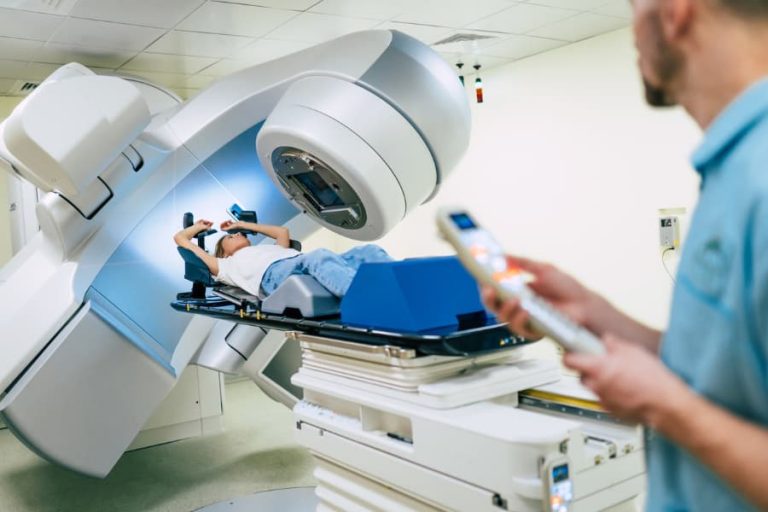Lung Cancer Treatment Options in NJ, CT, and MD
There are several types of lung cancer, including non-small cell lung cancer (NSCLC) and small cell lung cancer (SCLC). Overall, lung cancer is the second most common type of cancer in the U.S. Treatments vary depending on the type of lung cancer, whether and where the cancer has spread, and the patient’s overall health. The expert medical team at Regional Cancer Care Associates treat patients with all forms of lung cancer in New Jersey, Connecticut, Maryland, and the Washington, D.C., area.
Detailed Diagnoses Help Determine Lung Cancer Treatments

Once a patient has been diagnosed with lung cancer, the next step is to determine the type of lung cancer. Lung cancer staging draws on specific information, such as the size of tumors, the location of the lung cancer cells, and whether cancer has advanced to other parts of the body, to assign a stage that helps determine the best treatment approach for each patient.
Treatment Plans for Lung Cancer
Depending on the stage and type of lung cancer, as well as the general health of the patient, several lung cancer treatment options are available. The RCCA medical team will discuss all the pertinent options with a patient and then develop a treatment plan. Lung cancer treatment options include:
- Surgery: Often the first intervention in a comprehensive treatment plan, surgery can entail not only removal of any evident cancer in the lung but also, in many cases, removal of lymph nodes in the chest that may harbor cancerous cells or may help cancer cells spread throughout the body. Several types of surgery play a role in the management of lung cancer, including segmental or wedge surgery to remove a portion of the lung; lobectomy to remove one lobe of the lung; or pneumonectomy, which involved removal of an entire lung. In performing an operation, surgeons may make an incision in the side of the chest in a procedure, or they may utilize minimally invasive surgical techniques, sometimes assisted by a surgical robot.
- Radiation therapy: In this intervention, energy beams are used to kill cancer cells or prevent their growth. Radiation therapy may be delivered by external beams directed at the body by a highly sophisticated machine, such as a linear accelerator or may entail implantation of radioactive materials directly into the lung in an approach called brachytherapy. Stereotactic body radiation therapy and ablative radiotherapy are used when physicians want to deliver a precisely focused, high dose of radiation to tumors while protecting surrounding tissues from exposure to radiation. Stereotactic radiosurgery is sometimes used to deliver radiation to lung cancers that have spread to the central nervous system, including the brain and spinal cord.
- Chemotherapy: Delivered intravenously or with pills taken by mouth, chemotherapy kills cancer cells. The length of chemotherapy treatment can vary from weeks to months, with breaks often introduced between rounds of treatment. RCCA physicians and nurses have deep expertise not only in administering chemotherapy but also in helping patients avoid, minimize, and manage the side effects of the therapy.
- Immunotherapy: Utilizing newer drugs and medical technologies, immunotherapy helps patients fight lung cancer by harnessing the power of those people’s own immune systems. The oncologists and hematologists of Regional Cancer Care Associates draw upon a wide range of immunotherapy options, including monoclonal antibodies, T-cell therapy, checkpoint inhibitors, and vaccines, in developing personalized treatment plans.
- Targeted therapy: Many, but not all, lung cancers develop because of specific genetic mutations that can be treated by drugs that target those mutations. When testing determines that one of these mutations played a role in a patient’s lung cancer, a targeted therapy can be an excellent treatment option.
Additional Approaches to Lung Cancer Treatment
Lung cancer often is treated with a combination of the therapies described above. In some cases, those therapies are given simultaneously, while in other instances they are administered sequentially, such as when chemotherapy follows or precedes surgery.
Integrative care and palliative care for people with lung cancer provide medical treatments, assistance with lessening the effects of symptoms and side effects, and supportive therapies for mind, body, and spirit. At Regional Cancer Care Associates, physicians may recommend that patients avail themselves of a yoga practice or other physical activity. Patients also may be encouraged to receive nutrition counseling and massage therapies. Many patients also find assistance and healing through counseling services and faith organizations.
Find Expert Lung Cancer Treatment in NJ, MD, and CT
Early detection and intervention can lead to more effective treatment and better outcomes for people with lung cancer. Regional Cancer Care Associates has r 25 care centers throughout New Jersey, Connecticut, Maryland, and the Washington, D.C., area. All are staffed by highly experienced physicians who offer comprehensive, cutting-edge, and compassionate care. Make an appointment at a location convenient to where you work and live today.